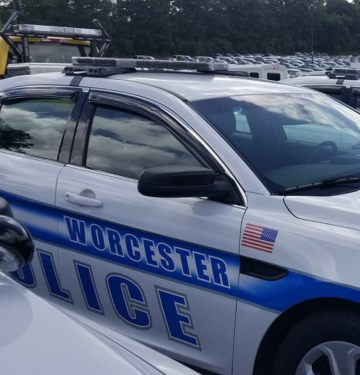Horowitz: High Trust in Principals, Police & the Military—-Not Congress or Tech Executives
Tuesday, October 22, 2019

PHOTO: Worcester Police
As the survey report elaborates, “…the public has the most confidence in the way K-12 public school principals, military leaders and police officers operate when it comes to caring about people, providing fair and accurate information to the public and handling resources responsibly” Some 84% think principals care about the students they serve “some of the time” or “all or most of the time,” 79% think police officers care about them at that level of frequency, and 73% have the same level of confidence in military leaders.
Members of Congress and leaders of technology companies didn’t earn nearly as high marks. Only about half of American adults think that members of Congress and “tech firm bosses” care about people all, most of. or some of the time, for example. Roughly, the same percentage of people believe that Congress provides fair and accurate information at least some of the time, while tech leaders do a bit better with 6-in-10 thinking they provide fair and accurate information at least some of the time.
Falling in the mid-range, with most American adults still indicating fairly high degrees of trust, are religious leaders, journalists, and local elected officials. Generally speaking, in polls of public opinion, local elected officials are far more favorably perceived than national elected officials. People have more faith in local government and in most cases believe their city or town is far better managed than the national government.
While most of the findings in this survey, held across the board, there were some key differences among segments of the population. Journalists, for example, were much less trusted by self-identified Republicans. Police officers were not as trusted by African-Americans and Latinos. “Roughly seven-in-ten white Americans (72%) say police officers treat racial and ethnic groups equally at least some of the time. In comparison, half of Hispanics and just 33% of black adults say the same,” the poll report states.
In general, Americans do believe that people in positions of power--even among the groups of leaders they trust more-- often behave unethically and that there are usually few consequences for doing so. Similarly, they believe these societal leaders only rarely admit mistakes or take responsibility for them.
The precipitous decline in public confidence in our leaders and institutions is one of the major problems facing our democracy, making it far more difficult to get things done. The Pew study provides important insights into this problem. To read the whole report, click on

Related Articles
- Horowitz: Courageous GOP Congressman Talks About What is Actually in Mueller Report
- Horowitz: Mueller Speaks
- Horowitz: The American Public Believes that Made-up News is a Big Problem
- Horowitz: Trump Refuses to Shut the Door on Foreign Interference in Our Elections
- Horowitz: A Positive Climate Milestone - Renewables Pass Coal
- Horowitz: Social Media Use Remains Robust Despite Negative Publicity
- Horowitz: Climate Adaptation Committee Disbanded by Trump Re-Forms to Fill the Gap
- Horowitz: America is Not Full
- Horowitz: Mueller Report - Nuanced But Still Devastating
- Horowitz: Biden Gets In
- Horowitz: Biden Debate Performance - Yellow Caution Flag
- Horowitz: The Iran Mess - Paying the Price for Trump’s Incoherent Foreign Policy
- Horowitz: Shutting the Door on Bahamian Hurricane Victims
- Horowitz: Sharpie-Gate
- Horowitz: The World’s Youth Send Strong Message on the Climate
- Horowitz: Trump’s Actions on Ukraine Earn Him an Impeachment Inquiry
- Horowitz: Some Republicans & Trump Supporters Speak Out
- Horowitz: California Out-Maneuvers Trump Administration on Climate
- Horowitz: It’s Time to Take on Assault Weapons & High Capacity Magazines
- Horowitz: A Tale of Two Presidencies on the Environment
- Horowitz: Trump Amps Up the Racism
- Horowitz: Alarm Bells Ring on Russian Election Interference
- Horowitz: Second Round of Democratic Debates Clarified Very Little
- Horowitz: Wheels Are Off at 1600 Pennsylvania Avenue




 Delivered Free Every
Delivered Free Every
Follow us on Pinterest Google + Facebook Twitter See It Read It